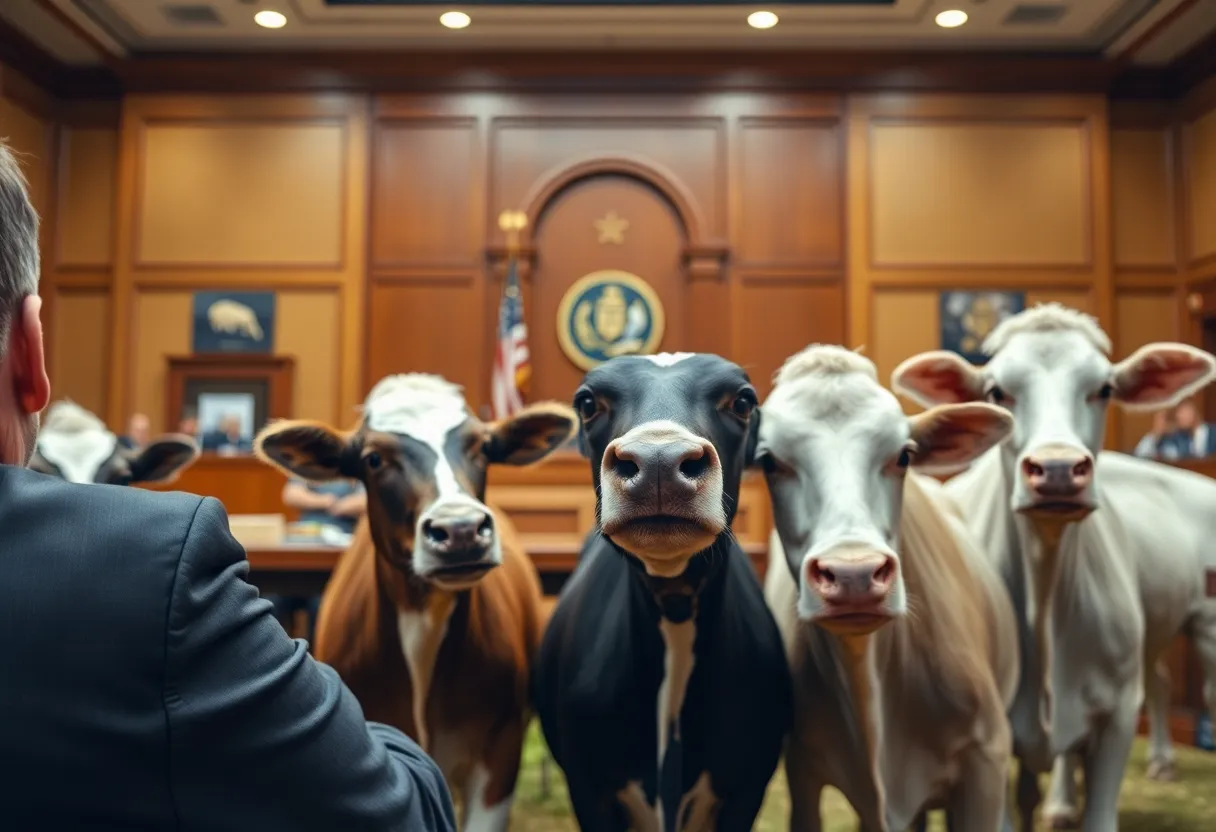News Summary
The Trump administration has launched a lawsuit against California’s Proposition 12, a pivotal animal welfare law aimed at improving the living conditions for farm animals. The lawsuit argues that Proposition 12 contributes to rising egg prices and conflicts with federal regulations. While the state’s standards were designed to enhance animal welfare, the administration contends that they are excessively stringent. As egg prices soar, the ongoing legal battle could significantly affect California’s agriculture sector and the future of animal welfare laws across the nation.
California
The Trump administration has initiated a lawsuit against California’s Proposition 12, a significant animal welfare law. This lawsuit claims that the state’s regulations on the housing of farm animals are contributing to the rising prices of eggs in the market.
Proposition 12, passed by California voters in 2018, established minimum space requirements for hens, pigs, and calves used in food production within the state. The law aims to enhance the welfare of farm animals by ensuring that they are not kept in cramped conditions. However, the Trump administration argues that California’s standards for egg production are in conflict with federal laws, specifically the Egg Products Inspection Act.
According to the Department of Justice, the regulations imposed by California are unnecessarily stringent and do not contribute to consumer welfare. The lawsuit claims that as a result of these heightened standards, egg prices are on the rise. Recent reports indicate that egg prices in California have surged, reaching an average of $9.32 per dozen, making the state among the highest in the nation for egg prices.
Economists focusing on agriculture have identified the ongoing bird flu epidemic, which has led to the culling of more than 100 million hens, as the primary driver behind the sharp increase in egg prices. The drastic reduction in the number of egg-laying hens due to this crisis has created a significant imbalance in supply and demand.
The recent legal action against Proposition 12 follows a ruling earlier this year by the U.S. Supreme Court, which upheld the law, affirming its position as the strongest animal welfare statute in the country. Many egg producers in California have already made significant investments to comply with these regulations, and reversing the law could pose economic hardships for farmers who have adapted their operations.
The lawsuit not only seeks to challenge Proposition 12 but may also be perceived as a political strategy by the Trump administration to weaken California’s environmental and animal welfare initiatives. The state has set ambitious standards, and anew a bill, known as the Food Security and Farm Protection Act, has been introduced that aims to nullify Proposition 12 along with similar laws in other states.
Critics of the potential reversal of Proposition 12 warn that allowing egg producers from states with lower animal welfare standards to operate in California could overwhelm the local market. This could lead to a compromise in animal welfare practices that many California consumers support.
In the backdrop of this legal dispute, smaller and mid-sized egg producers within California have voiced opposition to any efforts to dismantle the state’s cage-free laws, indicating that they align with broader animal welfare values and consumer expectations regarding food production.
As the lawsuit unfolds, there are concerns about its possible effects on California’s delicate egg supply chain, which is still recovering from the impacts of the bird flu. The outcome will not only affect egg prices and producer operations within the state but also set a precedent for future agricultural and animal welfare laws across the nation.
Deeper Dive: News & Info About This Topic
- Wall Street Journal: California’s Cage-Free Regulatory Scramble
- Vox: Proposition 12 and the DOJ Lawsuit
- Los Angeles Times: Trump Admin Sues California Over Animal Welfare Law
- Brownfield Ag News: Cage-Free Suit Prompts Prop 12 Questions
- Wikipedia: Proposition 12

Author: STAFF HERE MISSION VIEJO WRITER
The MISSION VIEJO STAFF WRITER represents the experienced team at HEREMissionViejo.com, your go-to source for actionable local news and information in Mission Viejo, Orange County, and beyond. Specializing in "news you can use," we cover essential topics like product reviews for personal and business needs, local business directories, politics, real estate trends, neighborhood insights, and state news affecting the area—with deep expertise drawn from years of dedicated reporting and strong community input, including local press releases and business updates. We deliver top reporting on high-value events such as Oso Fit 5K Fun Run and Community Health Fair, Walk Against Drugs & Community Fair, and National Night Out. Our coverage extends to key organizations like the Mission Viejo Chamber of Commerce and Providence Mission Hospital Mission Viejo, plus leading businesses in retail and education that power the local economy such as The Shops at Mission Viejo, Capistrano Unified School District, and Amazon Delivery Station. As part of the broader HERE network, including HEREAnaheim.com, HEREBeverlyHills.com, HERECostaMesa.com, HERECoronado.com, HEREHollywood.com, HEREHuntingtonBeach.com, HERELongBeach.com, HERELosAngeles.com, HERESanDiego.com, and HERESantaAna.com, we provide comprehensive, credible insights into California's dynamic landscape.


